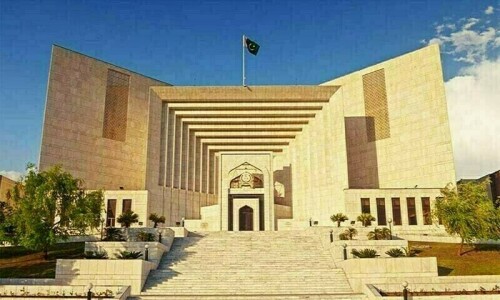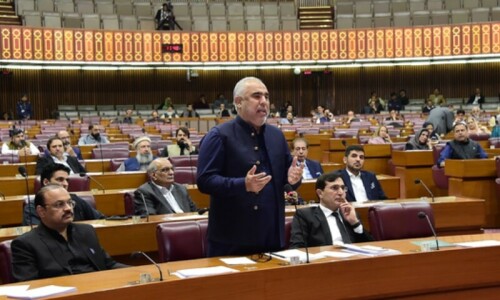The parents and other family members of martyred students of the 2014 Army Public School (APS) Peshawar carnage are pinning hopes on the Supreme Court of Pakistan after completion of a judicial inquiry by a single-member commission recently.
They have attached many expectations with the said inquiry and are hoping the report will be made public and action taken against officials whose negligence had resulted in one of the worst acts of terrorism in the country which had left 147 people, mostly students, martyred.
Following extensive proceedings spread over almost 20 months, the presiding officer of the commission Justice Mohammad Ibrahim on July 9 submitted the report to the Chief Justice of Pakistan Justice Gulzar Ahmed.
The commission was constituted on Oct 12, 2018, by the Peshawar High Court on the order of the Supreme Court and it had started functioning on Oct 19, 2018.
The commission’s spokesman has told mediapersons that it had recorded statements of 132 persons, 31 of whom were police and army officials whereas rests of the 101 were witnesses, including injured students and parents of the martyred children. The commission had also examined different investigations conducted by police as well as security agencies.
“I intend to move an application in next few days before the apex court with a request to the Chief Justice of Pakistan to provide us a copy of the inquiry report so that we should know the findings of the commission,” said Ajoon Khan, president of APS Shuhada Forum. He said as the commission was set up on their demand it was their right to receive a copy of the report.
He told Dawn that the inquiry report was a public document and it should not be kept secret. “We are expecting that the Supreme Court should also constitute a bench for hearing us in the light of the findings of the commission,” he said.
Ajoon Khan, whose son was a student at APS and martyred in the occurrence, said that the Terms of Reference of the commission were not limited to a specific issue and one of the major issues of concern for the parents of martyred students was that responsibility should be fixed on officials found guilty of negligence.
Following the occurrence the parents came to know about a confidential letter through which the National Counter Terrorism Authority (Nacta) had on Aug 28, 2014, informed different provincial and federal authorities that the Tehreek-i-Taliban Pakistan (TTP) had made a plan to carry out terrorist activities against Army Public School and College and other educational institutions run by Pakistan Army and to kill maximum number of children of army officers to avenge the killings of their accomplices.
The commission has recorded statements of important army officers, including then Peshawar Corps Commander Lt General Hidayatur Rehman, then chairman of Army Public Educational Institutions (APEI) BoG Brigadier Mudassir Azam; an officer of 102 Brigade, HQ-11 Corps, Brigadier Inayatullah; Major Doctor Asim Shehzad of Army Medical Corps; and secretary of BOG Colonel Hazrat Bilal.
Similarly, the commission recorded statements of some high-ranking police officials, including two former provincial police officers Salahuddin Mehsud and Nasir Durrani, then DIG of Counter Terrorism Department Mohammad Alam Shinwari, then secretary of home and tribal affairs department Akhter Ali Shah, then capital city police officer Ijaz Khan, then SP Cantt Faisal Shehzad and then SP City Mustafa Tanveer and others.
Proceedings of the commission had to be delayed for some time due to different reasons especially because of tension on the border between Pakistan and India.
Then Chief Justice of Pakistan Justice Mian Saqib Nisar had taken notice of the issue in April 2018 when during his visit to Peshawar several of the parents of the deceased students had approached him. Subsequently, on May 9, 2018, a SC bench headed by the Chief Justice ordered conducting of an inquiry into the occurrence through a judicial commission comprising a PHC judge.
Since the occurrence, the aggrieved parents had been approaching different forums and putting forward different demands. However, both the federal and Khyber Pakhtunkhwa governments were reluctant to accept their demands, including the one related to conducting a judicial inquiry.
Ajoon Khan had also filed a writ petition in the Peshawar High Court seeking directives for the government to provide them relevant information in relation to the attack.
In their comments filed in the high court, the KP government and police had stated that after receiving the threat alert from the federal government in Aug 2014 about possible militant attack on educational institutions run by the Army authorities, they had informed management of all such schools, including the APS Peshawar.
The home secretary and IGP, in their joint comments, had stated that during that occurrence the police had performed its duty as per its capacity.
The officials stated: “Administration of all under threat schools/colleges including Army Public School and College Warsak Road Peshawar Cantt was duly informed about the threat alert. SDPO Cantt, and SHO Michni Gate held a meeting with the principal on 01.09.2014 and sensitised her of the Threat Alert and precautionary measures required to be taken in light of an already circulated security advisory.”
They had stated that there were 15 education institutions in Peshawar that were run by the Army authorities.
A TTP commander Umer Mansoor had claimed responsibility of this terrorist attack. The US government and Pakistan Army had confirmed that Umer was killed in a US drone strike on July 9, 2016, in Nangarhar province of Afghanistan. Military courts set up after the incident had convicted seven persons in connection with the APS attack. Six of them were sentenced to death whereas the seventh one was awarded life term in prison.
Published in Dawn, July 13th, 2020


















































